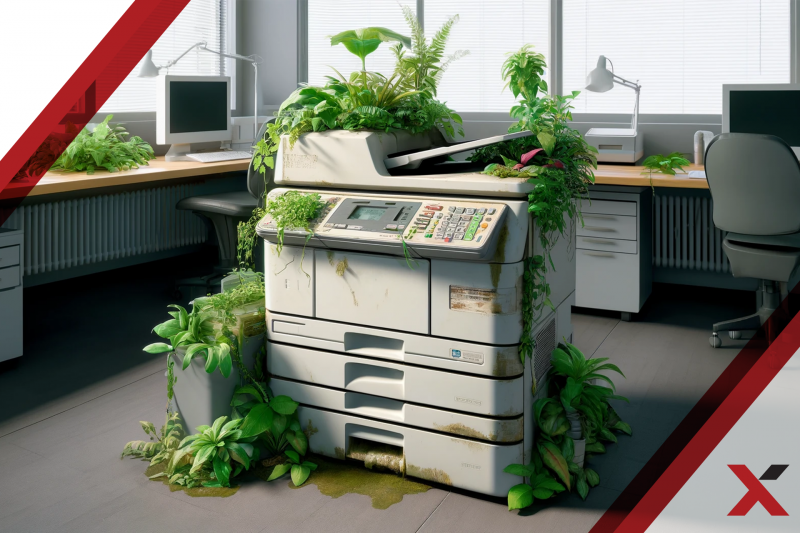Staying up-to-date on technological advances isn’t just important, it’s the cornerstone to keeping your company efficient and secure. Yet, many organizations allow their printer fleets to become antiquated, a decision—or lack of one—that can compromise their workflows and integrity. What’s worse, it can impact their cashflow as well. Understanding the flawed logic behind this oversight can give us insight into the benefits of updating your printer fleet. Spoiler alert: It’s worth it.
1. Cost Concerns
A common reason organizations don’t update their existing printers is the initial cost. If the printers are still working, replacing them is an unnecessary expenditure, right? Wrong.
The flawed logic of “if it ain’t broke, don’t fix it” fails to account for the hidden costs of outdated technology. Some of these costs are higher maintenance expenses, decreased productivity due to downtime, and increased vulnerability to the latest security breaches.
A cost-benefit analysis that includes these hidden expenses often reveals that investing in updated printer technology results in long-term savings. Moreover, options like leasing or Managed Print Services (MPS) can make fleet updates more financially beneficial.
2. Underestimating Security Risks
Many companies underestimate the security risks associated with outdated printers, viewing them as mere peripherals rather than integrated parts of their IT infrastructure. These days, it’s all connected.
Just as technology has advanced, so have the aggressive tools of cyber attacks. From malware, to phishing and ransomware, all of these can exploit the vulnerabilities in any network-connected device, including printers, to access your sensitive company and customer data.
Since your printers are potential entry points for cyber threats, it makes sense to update them whenever you can. Prioritize models equipped with the latest security features, such as user authentication and data encryption. That’s how you safeguard your company effectively.
3. Resistance To Change
Change within a company is often met with resistance, especially when it comes to replacing familiar technology with brand-new systems that require training and adaptation. We get it, change is hard. But it’s not as hard as dealing with the negative results of never evolving, especially in business.
First off, using outdated technology that no longer meets your organization’s needs is inefficient and frustrating. And secondly, the time wasted by your team with all these outmoded processes is a big waste of money. Work smarter, not harder, no matter how comfortable the old way was.
Encouraging a culture of continuous improvement and innovation in your company can greatly help ease the transition. Training your team in the benefits of any updated technology is the key. Once your employees can fully appreciate the increased efficiency, functionality, and user satisfaction capable with these new machines, reluctant resistance will transform into enthusiastic acceptance.
4. Overlooking Technological Advancements
Some organizations fail to keep pace with technological advancements, either due to a lack of awareness or a misconception that their existing printer fleet is good enough. But what you don’t know, can hurt you.
A company shouldn’t ignore the rapid evolution of technology in any area, including printers. Modern printers offer significant enhancements in efficiency, environmental sustainability, and integration capabilities with digital workflows. They’re strong, faster, and more fun at parties (so we’ve heard).
It’s important for you to stay up to date on technological advances and how you can move your company forward by leveraging the latest features. If you keep your printer fleet up-to-date, it can help your business stay on the forefront of your industry.
5. Lack Of Strategic IT Planning
Often, organizations lack a strategic approach to IT planning. They treat printer fleet management as a reactive task rather than a proactive component of their overall IT strategy. This isn’t good.
This reactive approach can lead to missed opportunities for optimizing operational efficiency and cost savings through strategic investments in technology. If you don’t look ahead, you can easily fall behind.
By integrating printer fleet management into your company’s broader IT strategy, you can stay ahead of the curve. With regular reviews and planning sessions, your organization ensures that tech updates, including printers, will always be in tandem with the organization’s growth and changing needs.
The Impact Of Keeping Printer Fleets Current
Operational efficiency, data security, and environmental sustainability are all affected by a company’s print operations. Empowering your team with state-of-the-art equipment will speed up your workflows, save time and money and boost morale. Additionally, better print security and more sustainable machines will pave the way for your business to grow.
Ready for even greater success? Partner up with an experienced Managed Print Services company. Our FlexTG professionals can work with you through the entire updating process.
We can help you assess your current fleet, order just the right machines, and set up your printer network to efficiently meet your company’s needs.

